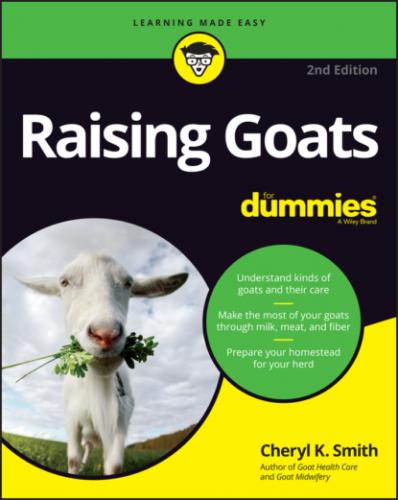Raising Goats For Dummies. Cheryl K. Smith
of Goats: Fiber, Breeding, Weed Control, and More Harvesting and Selling Fiber Creating Mini Breeds Backpacking with Goats Offering Buck Service Boarding Other People’s Goats Selling Compost Hiring Out for Weed Control Providing “Goat Therapy”
9 Part 5: The Part of Tens Chapter 19: Ten Common Mistakes First-Time Goat Owners Make Getting Too Many Goats Too Fast Failing to Educate Yourself before Getting Goats Underestimating the Costs Paying Too Much or Too Little for Your Goats Getting Only One Goat Buying Unhealthy Goats Neglecting Routine Management and Care Overlooking Your Goats’ Dietary Needs Giving the Goats Too Little Attention Getting a Buck before You’re Ready Chapter 20: Ten Misconceptions about Goats Goats Will Eat Anything Goats Stink Goats Aren’t Very Smart Goats Make Good Lawn Mowers Goat Milk Tastes Bad Goat Meat Tastes Bad Goats Get Most of Their Water from Plants Goats Are Only for People Who Can’t Afford Cows Only Male Goats Have Beards A Dog Makes a Good Friend for a Goat
10 Appendix: Goat-Milk Recipes Cheeses and Yogurt Drinks Entrees and Side Dishes Desserts
11 Index
List of Tables
1 Chapter 2TABLE 2-1 Distinguishing Goats from Sheep
2 Chapter 9TABLE 9-1 Comparing Identification Methods
3 Chapter 10TABLE 10-1 Dewormers for Specific ParasitesTABLE 10-2 Goat Vaccinations
4 Chapter 12TABLE 12-1 Some Infectious Causes of Abortion
5 Chapter 13TABLE 13-1 A Sample Goat Feeding Schedule
6 Chapter 15TABLE 15-1 Solving Common Milking Problems
7 Chapter 16TABLE 16-1 Holidays Popular for Goat Meat
List of Illustrations
1 Chapter 2FIGURE 2-1: The parts of a goat’s body.FIGURE 2-2: The parts of a goat’s digestive system.FIGURE 2-3: You can tell a goat’s age by his teeth.
2 Chapter 3FIGURE 3-1: An Alpine goat.FIGURE 3-2: A LaMancha goat with gopher ears.FIGURE 3-3: A Nubian goat.FIGURE 3-4: Nigerian Dwarf goat.FIGURE 3-5: An agouti Pygmy goat.FIGURE 3-6: A South African Boer buck.FIGURE 3-7: A long-haired Spanish goat, also considered Cashmere.FIGURE 3-8: An Angora buck.
3 Chapter 4FIGURE 4-1: A tree goat-proofed with a wooden enclosure.FIGURE 4-2: A milk stand.
4 Chapter 5FIGURE 5-1: A corner sleeping shelf is easy to build.FIGURE 5-2: Sleeping shelf frame assembly.FIGURE 5-3: Old roofing material and pallets can become an outdoor shelter for ...
5 Chapter 6FIGURE 6-1: A simple homemade hay feeder.FIGURE 6-2: You can build a simple mineral block holder.FIGURE 6-3: A fodder system.
6 Chapter 8FIGURE 8-1: A pack goat can carry up to 20 percent of its body weight in a pann...FIGURE 8-2: Put your goat to work by teaching him to pull a cart.
7 Chapter 9FIGURE 9-1: You can buy hoof trimmers from a livestock supply store.FIGURE 9-2: Bend the leg before you begin clipping a hoof.FIGURE 9-3: You can sit behind the goat to trim back hooves.FIGURE 9-4: First trim off any growth on the front walls of the hoofFIGURE 9-5: Trim the heel a little at a time so it is even with the sole.FIGURE 9-6: A goat stands on a properly trimmed hoof at about a 45-degree angle...FIGURE 9-7: A disbudding iron burns the horn bud, causing it to eventually fall...FIGURE 9-8: Kid ready for disbudding in a kid holding box.FIGURE 9-9: Hold the kid’s head still while you apply the disbudding iron.FIGURE 9-10: When you are finished disbudding, you see a copper-colored ring.FIGURE 9-11: Horns that regrow after disbudding are called scurs.FIGURE 9-12: An elastrator is the most common tool for castrating.FIGURE 9-13: You use the Burdizzo to castrate a goat by crushing the spermatic ...
8 Chapter 10FIGURE 10-1: Injection sites.FIGURE 10-2: Feeling the vein and inserting the needle.
9 Chapter 11FIGURE 11-1: The head of a biting louse (left) is smaller than that of a suckin...
10 Chapter 12FIGURE 12-1: Check the ligaments on a goat to tell whether she is going to kid.
11 Chapter 13FIGURE 13-1: A doe may lie down to deliver her kid.FIGURE 13-2: In a normal birth presentation, the goat is positioned head first,...FIGURE 13-3: The kid’s back feet are positioned first in a breech birth present...FIGURE 13-4: Keep a kid’s head up when you tube-feed it.
12 Chapter 15FIGURE 15-1: Wrap your thumb and forefinger around the teat to trap the milk an...FIGURE 15-2: A Simple Pulse machine works well if you don’t have a large number...
13 Chapter 17FIGURE 17-1: Setting up a goat.
14 Chapter 18FIGURE 18-1: Shearing a goat.
